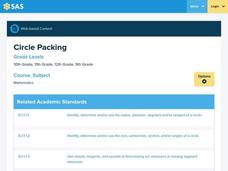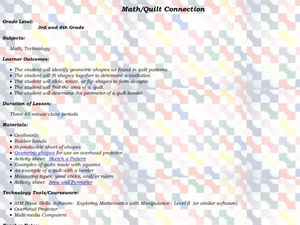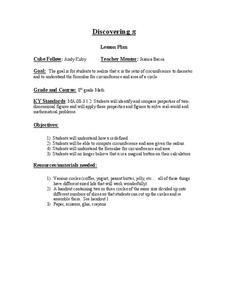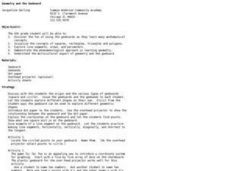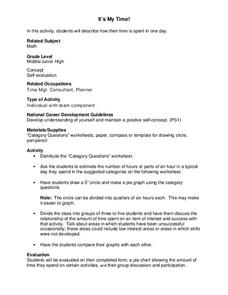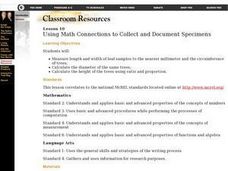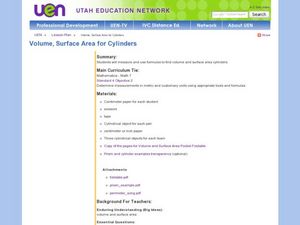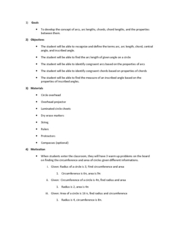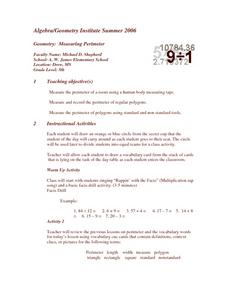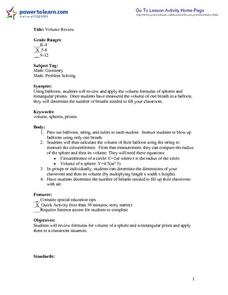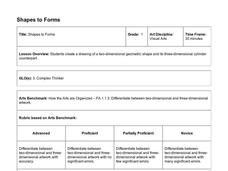Curated OER
Circle Packing
Students identify different parts and properties of circles. In this geometry lesson, students identify the radius, diameter, semicircle and inscribed angle of a circle. They identify the tangent lines to a circle.
Curated OER
Math/Quilt Connection
Students explore quilting. In this math patterns lesson, students define the perimeter of a quilt border, create tessellations using geometric shapes, and detemine the area of a quilt.
Curated OER
Worksheet 25 - Chain Rule
In this chain rule worksheet, students use the chain rule and substitution to find partial derivatives. They identify total surface area, and find the distance from the origin to the plane. This one-page worksheet contains seven...
Curated OER
Discovering Pi
Learners relate Pi to a circle. In this circles activity, students identify the different properties of two dimensional objects. They relate Pi to the circumference, diameter and area of a circle .
Curated OER
Approximation of Pi
Young scholars explore the concept of Pi. In this Pi lesson, students measure the circumference and diameter of a circle. Young scholars record the diameter and circumference measurements from their classmates. Students...
Curated OER
Geometry and Geoboard
Sixth graders use geoboards and dot paper to experiment with geometric concepts. In this geometry lesson plan, 6th graders complete four activities using geoboards or dot paper including naming points on a coordinate plan and finding the...
Curated OER
Circles in the Landscape: Irrigating Oklahoma Crops
How do you grow crops in a area with insufficient rainfall? Why you irrigate, of course. Class members investigate irrigation systems by designing a system of their own. After examining irrigation related concepts, vocabulary terms, and...
EngageNY
The Binomial Theorem
Investigate patterns in the binomial theorem. Pupils begin by reviewing the coefficients from Pascal's triangle. They look at the individual terms, the sums of the coefficients on a row, and the alternating sum of each row. Individuals...
Curated OER
It's My Time!
Learners create a pie chart. In this time lesson, students determine the amount of time they spend on given activities. They create a pie chart diagraming the data. Learners share their graphs with the class.
Curated OER
Segments Formed by Intersectiong Chords, Secants, and Tangents
Learners investigate the properties of segments formed which chords, secants, and tangents, intersect. The dynamic nature of Cabri Jr. allows high schoolers to form and verify conjectures regarding segment relationships.
Curated OER
Cylinder Volume Lesson Plan
Tenth graders define the formula for cylinders and use it to solve real world problems. For this geometry lesson, pupils differentiate between area, perimeters, 2D shapes, 3D shapes, and volume of prisms, cylinders and spheres. They...
Curated OER
Surface Area and Volume of a Cylinder
Seventh graders find the surface area and volume of a cylinder. In this area and volume lesson, 7th graders complete several activities to learn the volume and surface area of cylinders.
Curated OER
Using Math Concepts to Collect and Document Specimens
Students determine the length and width of leaf samples to the nearest millimeter and the circumference of trees. They participate in a discussion about the importance of collecting specimens carefully. They compile accurate...
Curated OER
Calendar Math
Students count and name the numbers and days on the calendar in order to determine the date. They identify the month and the entire date, and determine the pattern shown on the calendar markers. Students then calculate how many days...
Curated OER
Square Circles
Students analyze and demonstrate how a circle can be measured in square units and examine how diameter, circumference and radius are related.
Curated OER
Volume, Surface Area for Cylinders
Seventh graders explore the concept of volume and surface area of cylinders. In this volume and surface area of cylinders lesson, 7th graders break cylinders into their base shapes of a circle and a rectangle. Students discover that...
Curated OER
Properties of Arcs, Lengths and Chords
Young scholars differentiate between the different properties of arcs, arc lengths, chords, and chord lengths. In this circles lesson, students calculate the arc length of a given circle, and find the measure of the inscribed angles of a...
Illustrative Mathematics
Toilet Roll
Potty humor is always a big hit with the school-age crowd, and potty algebra takes this topic to a whole new level. Here the class develops a model that connects the dimensions (radii, paper thickness, and length of paper) of a...
EngageNY
General Pyramids and Cones and Their Cross-Sections
Are pyramids and cones similar in definition to prisms and cylinders? By examining the definitions, pupils determine that pyramids and cones are subsets of general cones. Working in groups, they continue to investigate the relationships...
Curated OER
A Cone and Its Net
Create and investigate nets for solid shapes with your class. They identify the different parts and faces of each polygon and solid then calculate the surface area and volume of cones. They use circle sectors of varying sizes to build...
Curated OER
Measuring Perimeter
Have your class practice measuring the perimeter of various objects using this resource. Fifth graders place various-sized polygons in order (from largest to smallest). They use non-standard measuring tools to estimate the distance...
Curated OER
Linear Equations & Manipulatives
High schooler math students review operations and solve linear equations using manipulatives--squares, cubes, circles, and cups. They transfer the operations performed on the manipulatives in equation form.
Curated OER
Volume Review
Pupils investigate the concepts of volume for rectangular prisms and spheres. They measure the volume of one balloon and then consider how many breaths it would take to fill the room with balloons. The rectangular prism being measured is...
Curated OER
Shapes to Forms
Here is a math lesson that is really a visual arts lesson in disguise! In it, pupils utilize their knowledge of geometric shapes and forms to create a detailed version of a cylinder. The instructions on how to go about the task are very...
